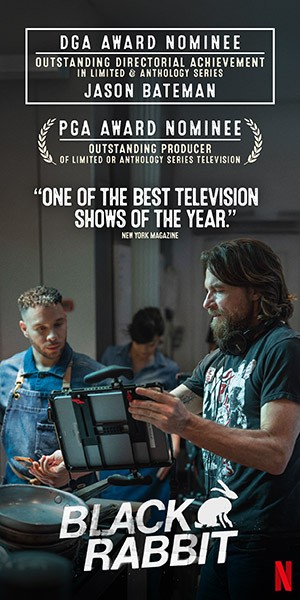On April 10, DGA members took a hilarious look at the world of comedy and Jewish humor in film from the past as the Jewish Committee (JC) hosted its inaugural event, Laughing Out Loud! Jewish Humor with Jason Reitman. The evening in the Guild’s Los Angeles Theater explored the trailblazers of Jewish comedy — Ernst Lubitsch, Billy Wilder, Mel Brooks, James Brooks, Mike Nichols and Ivan Reitman, and discussed what it has meant to the Directors and audiences to work in this form during a conversation moderated by Director/DGA National Board member Jon Avnet.
“I’m especially thrilled to be here as this is the first annual event of the DGA’s Jewish Committee,” said DGA President Lesli Linka Glatter in her welcome to the audience. “Since the silent era, comedy has had a long and unique role in cinematic storytelling and in breaking down barriers. This is particularly true when we think about the Jewish trailblazers being highlighted tonight. These Directors didn’t just make people laugh — they expanded what comedy could be. They infused it with intelligence, humanity, and a distinct perspective shaped by heritage. And their work continues to inspire, entertain, and resonate, proving that a good joke, told well, can be timeless. It reminded me that the stories we tell have so much power, and we can learn a lot through examining that power at events like this one.”
Glatter then introduced JC Co-Chairs Nora Gerard, Kevin Koster and David Semel, who spoke about the mission of the Committee before introducing Reitman and Avnet.
The conversation was kicked off by a screening of a clip from Ernst Lubitsch’s 1942 comedy, To Be or Not to Be, starring Jack Benny, Carole Lombard and Robert Stack. On the film set during the German occupation of Poland in WWII, Reitman said, “The most significant event in Jewish history over the last century is the holocaust. It’s not like Mel Brooks making The Producers -- which is already brave and genius -- this is something Lubitsch is doing in real time and that’s what I find so extraordinary. I don’t know as a filmmaker how brave you can be to do that. When I look at the tone, it is way broader than I can imagine and I always try to put myself into, ‘what was it like to sit in the theater at the time? Would it feel like it’s today watching a Taika Waititi film or a James L. Brooks film?’ How does this tone fit within the world than in the 1940s?”
Following a clip from Billy Wilder’s 1960 DGA and Academy Award-winning classic, The Apartment, Reitman shared his belief that an underscoring theme of assimilation permeates the film. “When I think about it in the context of this evening, I think about what it feels like navigating a new system and how you find your way. I think a lot about Billy Wilder and his dialogue. I think about when he escaped Germany right before the war, comes to America and develops a mastery of English so strong that his English is way better than anything I’ll ever write. He finds a way to assimilate and become a filmmaker almost immediately. It demonstrates our resilience. So much of our story is how do we hold on to who we are while we are on the run? It’s our ability to tell stories that has preserved that over generations.”
In his analysis of the clip from James L. Brooks’ 1997 DGA Award-nominated feature, As Good as It Gets,
Reitman remarked on the similarities with Wilder’s The Apartment. “The question I see in this clip is, ‘Am I loveable?’ I see them both (Jack Nicholson and Helen Hunt) saying that or ‘Do I have to be a fraud to be loveable? ‘Do I have to fake it?’ That’s what I see that Baxter is doing in The Apartment. ‘Will you love me if I’m wearing this hat, and I have this job and find a job and a way to assimilate and erase everything that you thought I was going to be?’”
Things got both political and familial with a look at his father Ivan Reitman’s 1993 romantic comedy, Dave. “When I think about this movie, I think about a couple of things,” said Reitman. “I think about my father first arriving in Canada and assimilating and figuring out how to be a Canadian and then moving here and moving into the film business and to assimilate into a whole other community and country and having to do a movie about how this could be a better country. I thought there was something very beautiful about that. We, as Jews, are always outsiders trying to just arrive and figure out, ‘How can we make this a better place?’”
Drawing from his own career, Reitman showed a clip from his 2009 DGA Award-nominated feature, Up in the Air, and revealed one of his casting techniques on the film. “We were shooting in St. Louis and Detroit -- two cities that were obliterated by the 2008 recession. We put an ad on the paper and said we were making a documentary about job loss, and we wanted to interview people about what it was like to lose your job during the recession. They came in, and we put them on camera and said, ‘We are going to do a little roleplay and fire you on camera and get you to react.’ Everything you see in the film are the performances of the people who lost their jobs. So, when George (Clooney) was firing someone in the film, it was actually someone who has lost their job.”
Moving into the present, the final clip of the evening was from Jesse Eisenberg’s 2024 buddy dramedy, A Real Pain. “The comedy is so tight,” noted Reitman. “The understanding of language, dialogue and rhythm and timing., it is something that goes way beyond movies back to vaudeville. You talk to old comedians and what they’re constantly talking about is the microseconds of timing and how important that is. And that’s what I see when I watch this. Jesse Eisenberg didn’t have to think twice about this.”
See video from this event in the gallery below.
About the Panelists:
 Jason Reitman Jason Reitman Reitman’s directorial credits include the feature films, Saturday Night, Ghostbusters: Afterlife, The Front Runner, Young Adult, Thank You for Smoking and Men, Women & Children. He was nominated for a DGA Award for his 2009 feature, Up in the Air, and garnered an Oscar nomination for his 2007 feature, Juno. A DGA member since 2000, Reitman currently serves as an alternate on the DGA National Board and as a member of the Western Directors Council, the Feature Diversity Task Force and the Independent Directors Committee. |
|
|
About the Jewish Committee
In February 2024, the DGA National Board granted provisional status to a new committee to address various issues of concern to the DGA’s Jewish members, including issues related to employment and rising anti-Semitism in the workplace and its impact on film and television. Members wishing to join the Jewish Committee will need to self-identify via their account settings. They may also opt to receive email about the events and meetings for any of the Guild’s Diversity Committees by updating their email addresses and subscription preferences as part of Email Settings in the personal account.
For more information about the Jewish Committee, contact DGA DEI Executive, Breannah Oppenhuizen at (310) 289-5377 or email baoppenhuizen@dga.org.

 Jon Avnet (moderator)
Jon Avnet (moderator) 


